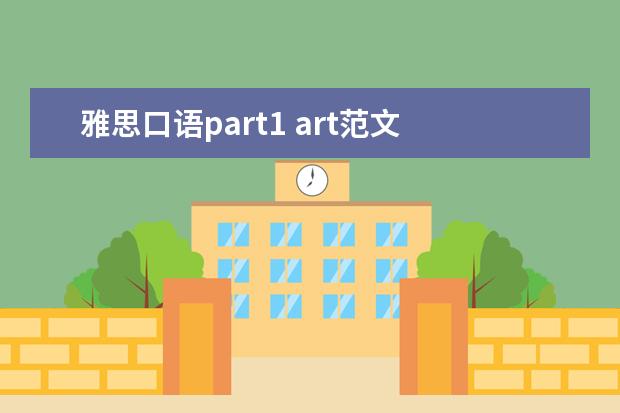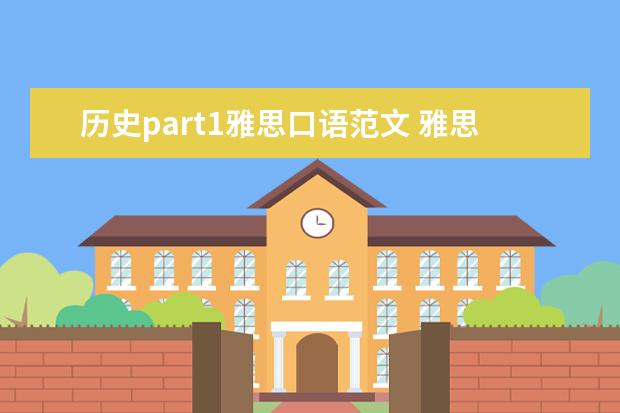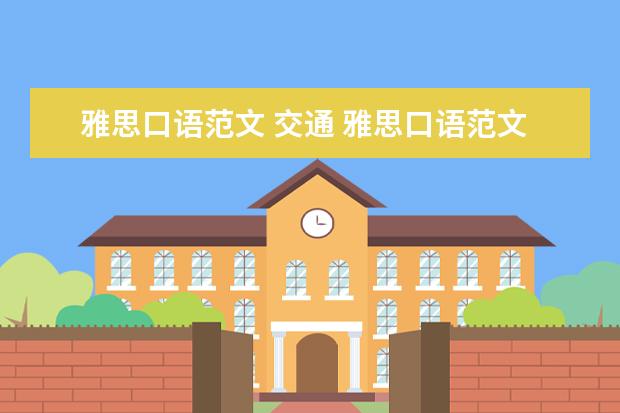当前城市:淄博[切换]
- 手机雅思无忧

扫码登录
雅思考试主要是通过对考生听、说、读、写四个方面英语能力的考核,综合测评考生的英语沟通运用能力,实现“沟通为本”的考试理念。对于雅思考生来说,也有很多考试难点和政策盲区需要帮助解答。今天雅思无忧网小编准备了雅思口语part1 art范文 雅思口语范文2009年雅思第一季度口试酷评,希望通过文章来解决雅思考生这方面的疑难问题,敬请关注。
雅思口语part2备考一直是众多考鸭们的头等难事,不敢开口,开口说不出,说不地道,相关正旅话题的经历太少,让人抓狂。下面我喊清友给大家带来雅思口语 范文 赏析:a quiz TV show,希望对大家的口语有帮助!
雅思口语范文赏析:a quiz TV show
Describe a quiz TV showWell, it seems that many TV channels like to present some quiz shows to the public, such as “the lucky 52” in CCTV2, “happy dictionary” in CCTV 3, and “great competition of intelligence” in CCTV 1. But here, I’d like to talk about a quiz show from Shenzhen TV channel, which is named as “who is cleverer”.
This quiz show brings the *s back to the primary school class, helps them recall those happy memories in the childhood, recollects those forgotten knowledge. It aims to attract audience of primary school students, as well as *s.
In this quiz show, a group of primary school students and a team of *s are competing on the same stage, for those seemingly familiar and seemingly simple questions from primary school subjects. It is fun to see the embarras*ent of those * compe*s unable to answer those easy questions, and it is also fun to see those primary students showing off their knowledge in front of their * compe*s. Altogether, there are 10 questions for each compe*, and those *s who can answer right all the 10 questions may have a chance to get the prize: 50 thousand YMB , but if he fail, he has to say to the audience, “wow, I am not so clever as a primary school student” and then he is replaced by another *s.
Wow, it’s so funny that after so many years education, almost no *s could win the game and get the prize. And it’s so interesting that this quiz show can bring so many parents and children in front of their TV sets to enjoy their get-together. I like the feeling of watching this kind of TV programs.
雅思郑槐口语Part 2话题:A Show or a Performance
雅思口语Part 2话题参考答案
Describe a show or performance
You should say:
what kind of performance it was
when and where you saw it
how it was performed
and explain how you felt about this performance.
My friends and I visited Laoshe Teahouse in Beijing last summer. It was our first time to visit such a famous place. We not only had nice tea but also enjoyed Chinese traditional art performances. It has been quite an impressive experience to me, and to my friends, too.
The teahouse is to the southwest of Tian’an Men Square. Its amazing Beijing style has attracted hundreds of visitors from home and abroad every day.
Before we decided to go, we had heard a lot about that place and we got very excited. We got even more excited when the performance was about to begin-audience from different parts of the world made the atmosphere hot. The performance began with a thrilling starting music. It was folk music played with Chinese traditional instruments. by Teahouse Music Band. The drum beats immediately dragged people’s attention. After starting music was Peking Opera Highlights with the name Presents from Magu. I didn’t quite follow its plot because I didn’t understand their singing. However, I like the music and the way it was presented. The most unforgettable show came when an artist from Sichuan started performing Face-Changing of Sichuan Opera. It was just like magic. He changed his face so quickly that no one could tell how he could manage that. This show gained much applause from the audience.
I am glad that I took my friends from the US to the Laoshe Teahouse that evening. We had wonderful time there. I like this kind of performance. It has become a special showcase of the essence of Chinese national culture, and a bridge connecting China with the rest of the world.
Part 3
Artistic Performances
1. Are traditional art forms performed very much in China?
In some *all cities and towns, where popular modern art is less introduced into, traditional art forms are still playing an important role in entertaining local people. In big cities, like Beijing and Shanghai, traditional art forms are kept well and performed a lot in big and *all theatres. I think people are getting more aware of protecting our own traditions, including traditional art performances. And this is why it’s now a fashion to go and watch a really good Beijing Opera show at a not so low price.
2. How does TV program help to spread traditional culture?
TV program helps greatly to spread traditional culture, definitely. For an obvious reason, people have easier access to a TV program than to a live show. Every one can afford it. So, with the help of TV show, more people would have the chance to be exposed to traditional culture.
3. What benefits do you think people derive from watching performances or visiting art exhibitions?
In my opinion, art is not a necessity in our life, like food and drink. But life cannot be without art. Sounds contradictory? Well, I mean, what people derive from watching performances or visiting art exhibitions is mental pleasure and satisfaction. People say art is the reflection of life. I agree. Suppose after a day of hard work, what will a piece of beautiful music bring to us? Comfort, relief, refreshment, and so many other mental enjoyment. Life is hard, but thanks to art, we become less depressed.
4. Do you think people generally prefer to go to a concert or to listen to recordings of music?
Generally, the majority would prefer to listen to recordings of music. It’s much easy to get and every one could afford the money and time. Besides, concert is concert. It’s live, and it’s one-time. You get there, you listen to it, and it’s over. Recordings can be listened to for many times. People choose to listen to their favorite recordings at any time, any place they like to.
The Performing Arts and Children
1. What is the value of watching artistic performance (or experiencing artistic activities) in relation to children's development?
Beauty education is important in children’s development. Watching artistic performance or experiencing artistic activities is a good way to have such an education. It helps children to build up their understanding of this world. They get to know what is beautiful and what is ugly, which is good for their growing-up. But there is one thing we have to be careful about. That is to choose the proper performance and activities, improper ones could only lead to a bad education.
2. What is the value of children learning to perform, such as learning to sing or dance in front of an audience?
It depends on if the child him/herself likes to do it or not. If it’s his/her own willingness to learn, it’s a hobby. Learning to perform will be a pleasant experience. Knowing how to perform could be a treasure for the child’s future development. Performing could be a well-paid occupation. However, if it’s not the child’s own wish to learn, it could be torture and I don’t think the child could get anything positive from the learning.
3. Do you think the performing arts should be included in school curriculums? (Why?/ Why not?)
Performing arts should be included in school curriculums as an optional course, but not a compulsive one. If it’s optional, students with interest can choose to attend the course and develop their performing talent. For students who are not that involved in performing, they can have enough freedom not to choose to attend the course. Otherwise, it would be a waste of time for those who don’t like performing.
4. Do boys and girls have the same feelings/attitudes about performing (or watching) an artistic performance?
For me, it’s a little blind to give a yes-or-no answer to this question. Well, if there is difference, I see it as the difference between individuals, but not between boys and girls.But…well, yes, I guess it’s easier for girls to get involved and become part of the story. I remember when I watched the play Cinderella many years ago, I cried when Cinderella was being tortured, but the boy sitting next to me didn’t.
5. Who do you think is more suited to learning how to dance - boys or girls?
It’s hard to say. We have female dancers as well as many successful male ones dancing on the world stage. I mean male dancers can achieve as high as females dancers do. However it is a fact that more girls are learning how to dance at an early age than boys. The Chinese thinking is like this. Girls have to be pretty, and dancing girls are just fancy. But for boys people hold different expectations. Boys are expected to be playful and tough. It is not seen as a right thing for boys to learn how to dance.
雅思口语自学有什么建议
雅思口语怎么自学?
第一:大量背诵原汁原味的单句、对话、生活习语。
第二:把每天背诵过的素材反复消化,借助想像力,身临其境把它们表演出来。
第三:写 日记 。这个习惯看上去练习的是写作,其实它更是练习口语的妙法。当你动笔的同时,你的大脑正在激烈地做着英文 体操 。用英文进行思维是高级的口语训练 方法 。
第四:大量阅读报刊、杂志及各种 故事 、杂文,之后将它们复述出来。(超级提示:是"复述"而非"背诵"。)同一篇 文章 的复述工作应该反复滚动。
第五:一年左右逐渐过渡到用英文进行日常的思维活动。每当遇到不会的词、句就记录在本子上,集中解决,并定时更新、复习最理想的练习口语的方法是有个说英语的外国人天天在你身边陪你说英语,但这个条件一般谁也不具备,那么怎么来练习口语呢,有一个好办法非常可行,就是自己和自己说练习 英语口语 (当然后期还要找一些外国人进行语言交流体验),请相信自己和自己练习口语这一办法很管用,新体系英语有一个方法,叫“反述式口语练习法”,推荐给你:
拿出一篇英语文章来先看懂,反复看几遍,争取记住里面的内容(注意千万别背),然后把文章翻扣在桌上,对着墙用自己的英语将刚才读过的文章反说出来(注意是述说,不是背诵),一开始根本记不住,就打开文章再看一遍,然后再翻扣过来用英语述说。
雅思口语高分需要怎么答题
首先,在回答第一部分时,切忌回答过短。
一些初识雅思的学生在口语上遇到的最大障碍之一就是没话可说,每个问题的答案都只有寥寥几个词。比如:Are you working orstudying-
I am working now. How do you spend your weekends- I spend my weekendsreading and watching TV. Do you read a lot in your spare time- Yes, I read a lotin mysparetime.其实如若您拿着这些问题去问一个初中生或甚至是小学生,他恐怕也能非常流利的给出这些答案的吧。既然如此,您又怎么能显示出您的水平决不仅止与此哪?雅思口语的高分诀窍就是要在很短的时间内将您的浑身解数都使出来。那么我们就要有意识的积累一些答题的技巧,也就是如何拓长自己的答案,并且灵活运用各种句型的方法。
此外,切题回答的本身就是对于细节的正确分析。
除了要注意运用适当的回答技巧之外,我们还要注意考题中的一些细节,通常对于这些细节的处理往往会直接决定第一部分的回答质量的好坏。由于口语考试的特点是需要学生在考官提出问题之后马上做出回答,过长的思考时间也会导致失分,所以我们在考官提出问题之后马上要对该问题迅速进行分析,同时给出答案
因此在考场中,考生回答偏题的现象时有发生。撇开考生由于语言水准问题理解错误的因素,有很多的偏题都是由于忽视考题中的细节问题所造成的。
以上就是雅思无忧网为您准备的访问雅思无忧网(https://www.yasi.cn/),了解更多雅思考试新消息,新动态。
雅思培训 雅思口语范文art 雅思口语范文2009年雅思第一季度口试酷评
雅思口语范文art 雅思口语范文2009年雅思第一季度口试酷评
雅思考试主要是通过对考生听、说、读、写四个方面英语能力的考核,综合测评考生的英语沟通运用能力,实现“
2023年07月18日 07:57 历史part1雅思口语范文 雅思口语范文2009年雅思第一季度口试酷评
历史part1雅思口语范文 雅思口语范文2009年雅思第一季度口试酷评
雅思考试主要是通过对考生听、说、读、写四个方面英语能力的考核,综合测评考生的英语沟通运用能力,实现“
2023年07月21日 06:30 2020雅思口语Art范文 求雅思口语Part3 Object –a work of art话题:How i...
2020雅思口语Art范文 求雅思口语Part3 Object –a work of art话题:How i...
雅思考试主要是通过对考生听、说、读、写四个方面英语能力的考核,综合测评考生的英语沟通运用能力,实现“
2023年07月18日 17:09 雅思口语讲故事 雅思口语范文2009年雅思第一季度口试酷评
雅思口语讲故事 雅思口语范文2009年雅思第一季度口试酷评
雅思考试主要是通过对考生听、说、读、写四个方面英语能力的考核,综合测评考生的英语沟通运用能力,实现“
2023年07月16日 21:19 雅思口语9分范文 雅思口语范文2009年雅思第一季度口试酷评
雅思口语9分范文 雅思口语范文2009年雅思第一季度口试酷评
雅思考试主要是通过对考生听、说、读、写四个方面英语能力的考核,综合测评考生的英语沟通运用能力,实现“
2023年07月17日 15:13 历史事件 雅思口语范文 雅思口语范文2009年雅思第一季度口试酷评
历史事件 雅思口语范文 雅思口语范文2009年雅思第一季度口试酷评
雅思考试主要是通过对考生听、说、读、写四个方面英语能力的考核,综合测评考生的英语沟通运用能力,实现“
2023年07月17日 16:09 雅思口语范文 交通 雅思口语范文2009年雅思第一季度口试酷评
雅思口语范文 交通 雅思口语范文2009年雅思第一季度口试酷评
雅思考试主要是通过对考生听、说、读、写四个方面英语能力的考核,综合测评考生的英语沟通运用能力,实现“
2023年07月17日 18:53 雅思口语neighbor范文 雅思口语范文2009年雅思第一季度口试酷评
雅思口语neighbor范文 雅思口语范文2009年雅思第一季度口试酷评
雅思考试主要是通过对考生听、说、读、写四个方面英语能力的考核,综合测评考生的英语沟通运用能力,实现“
2023年07月17日 20:14 最全雅思口语范文 雅思口语范文2009年雅思第一季度口试酷评
最全雅思口语范文 雅思口语范文2009年雅思第一季度口试酷评
雅思考试主要是通过对考生听、说、读、写四个方面英语能力的考核,综合测评考生的英语沟通运用能力,实现“
2023年07月17日 22:51 雅思口语游泳范文 雅思口语范文2009年雅思第一季度口试酷评
雅思口语游泳范文 雅思口语范文2009年雅思第一季度口试酷评
雅思考试主要是通过对考生听、说、读、写四个方面英语能力的考核,综合测评考生的英语沟通运用能力,实现“
2023年07月17日 22:56